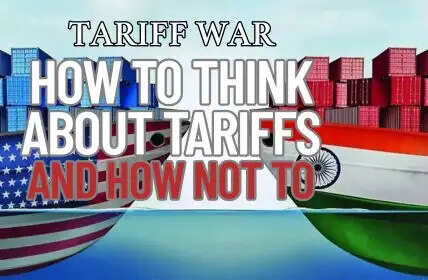Trade War: Here’s How To Think About Tariffs—and How Not To
Common but avoidable ways to interpret the situation:
a) "Tariffs will be rolled back, so it’s just a minor nuisance." It’s natural to think a sitting president wouldn’t hurt their own economy and that this is merely a scare tactic. That may be true—but it may not. The key is understanding the consequences of even a month of these measures continuing. Equity markets won’t wait for hope to turn into reality. Realized losses can become permanent if we panic at the wrong time. This is why asset allocation matters deeply. Men are known to do stupid things—and men in power, even more so.
b) "India’s tariffs are at 26% and China’s at 54%, so we’re better off.“ Not quite. Trade wars have a broad, debilitating effect on global growth. Don’t just focus on sector-specific impacts. When global trade slows, the hit to overall growth is significant.
c) “India’s exports to US is only 2% of India’s GDP and therefore we are unlikely to see a large impact.” This is a suboptimal framing of the problem. Trade wars are never bilateral. China, on which 104% tariff has been imposed (as of 9th April) can’t export at the same prices to US, it could dump it goods in another country where tariffs are lower. This recipient country is likely to retaliate, and this could take shape of a multilateral, global trade war. India’s exports are 12% to GDP and could be at risk if countries start imposing tariffs, not just on US, but on each other as well.
d) "If we survived COVID and the 2008 GFC, we can survive this too." A better mindset is to prepare rather than assume survival. Portfolios built with conservative asset allocation, diversification, and risk control can survive any market. Otherwise, deep losses can trigger poor behavioural responses at the worst possible time.
Trade War: The Tariff Taser
How to think about the trade war:
-
Best case: Trump reverses tariffs to pre-April 2nd levels or announces a temporary moratorium. This would be the strongest form of damage control and likely a short-term positive for markets.
-
Most likely case: Trump agrees to bilateral negotiations. This opens the door to a wide range of winners and losers, potentially keeping markets volatile and nervous.
-
Worst case: Other nations retaliate—not just against the US, but against one another. This scenario could have a serious impact on global and Indian growth. Markets won’t take this lightly—and with every passing day, this outcome becomes more probable.
How should investors act:
-
Use hybrid funds for new investments since markets have already declined somewhat. Focus especially on DAAF and MAAF categories. If your equity allocation is low, rebalance to normal levels using hybrids.
-
Avoid trying to predict or forecast the future of tariffs or the markets. If Indian large-caps decline another 10–15%, they may hit average valuations. Focus on exposing yourself to strategies which have a quality bias and are valuation respecting. Since investing isn't an exact science, use staggered purchases. There’s no need to rush.
-
Save emotional capital in times of turmoil by reducing the number of actions and transactions you do. High activity is an enemy of long-term compounding.
-
Most importantly, these unknown events create bargain opportunities in equities and other assets. Investors which have a multi-asset or conservative approach can take benefit from these events. When investors sell in an emotional response, the patient investors can gain from the bargains created. Stay the course.
DISCLAIMER
This note is for information purposes only. In this material DSP Asset Managers Pvt Ltd (the AMC) has used information that is publicly available and is believed to be from reliable sources. While utmost care has been exercised, the author or the AMC does not warrant the completeness or accuracy of the information and disclaims all liabilities, losses and damages arising out of the use of this information. Readers, before acting on any information herein should make their own investigation & seek appropriate professional advice. Any sector(s)/ stock(s)/ issuer(s) mentioned do not constitute any recommendation and the AMC may or may not have any future position in these.
To join us on Facebook Click Here and Subscribe to UdaipurTimes Broadcast channels on GoogleNews | Telegram | Signal



